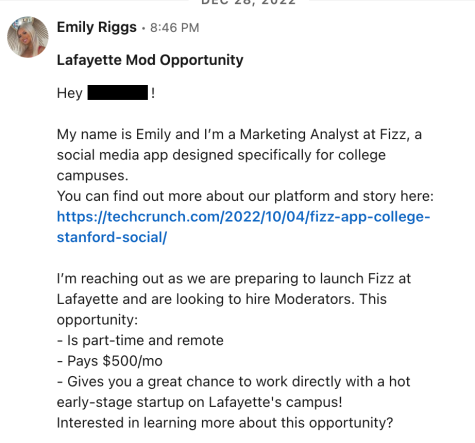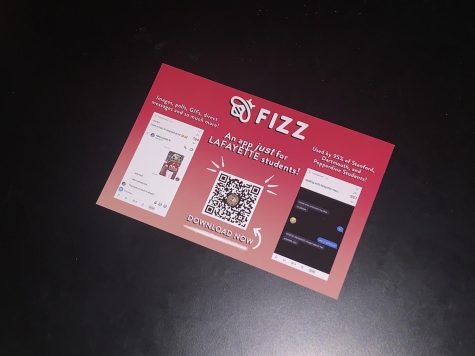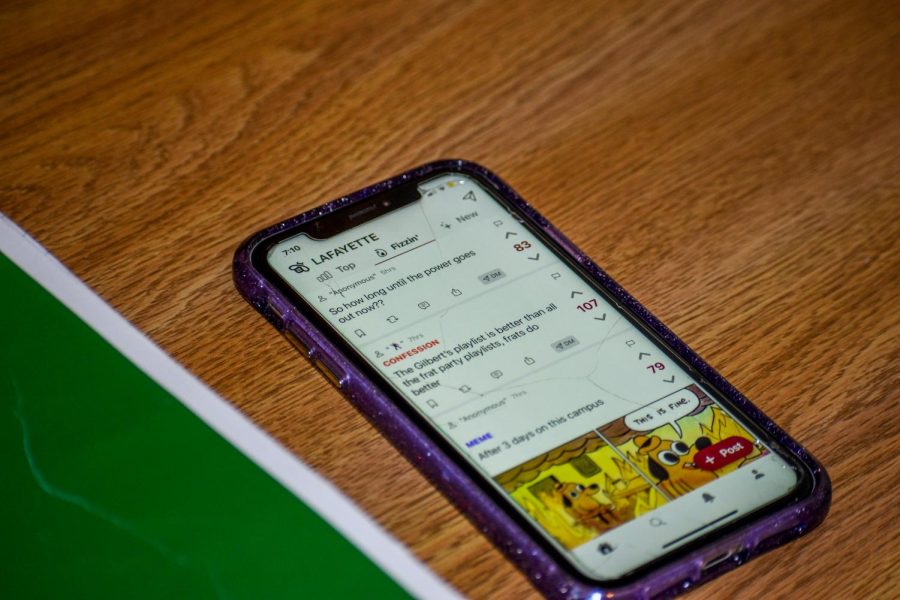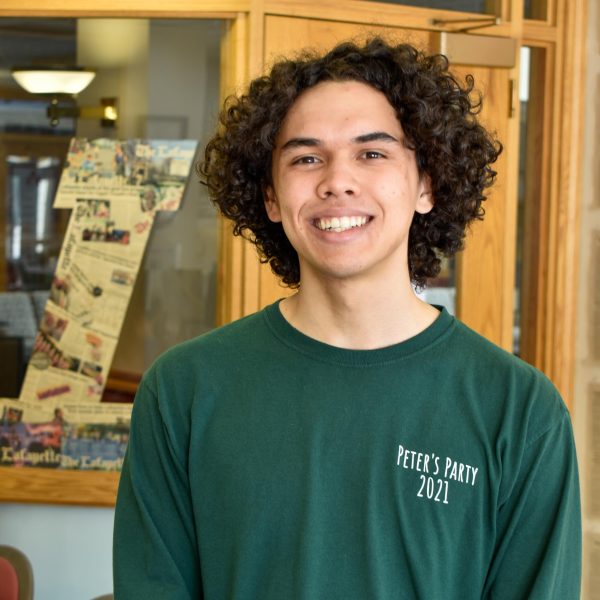Representatives for an anonymous messaging app marketed as “just for Lafayette students” carried out an advertising blitz on campus this week despite rebukes from college administrators. The app, Fizz, was peddled to students with promises of free donuts, merchandise and drinks from College Hill Tavern, but representatives for the app appear to have breached college policy by tabling and handing out explicitly worded flyers with Lafayette iconography.
The push for Fizz appears to be led by Michael Fonseca, a Fizz marketing analyst, according to his LinkedIn. Fonseca, who has been employed by the company for only one month, positioned Fizz as a direct competitor to YikYak, the anonymous social media app dominant on campus, according to screenshots of statements made to the “Lafayette Fizz Ambassadors” GroupMe obtained by The Lafayette. The promotional tactics employed by Fizz appear identical to Fizz launches at several other schools.
Out of the Lafayette students on Fizz’s payroll, roughly 15 were tapped to moderate content in the Lafayette Fizz community as moderators – a day-long task typically handled by outsourced, full-time content moderation teams. These students, according to lead Fizz ambassador Jackson Chambers ‘24, must post dozens of times per day on the app to stimulate usage and are each paid $500 per month.
“I’d imagine there wouldn’t be as much traction [without the posts],” Chambers said.
Several students expressed confusion and concern over the interview process to join Fizz. One such student, Aarika Mattys ‘24, was contacted by a Fizz representative via LinkedIn to interview for the moderator position. When she joined a Google Meet call days later to interview, no representative from the company appeared. She subsequently attempted to reach out to her interviewer, but she received no response.
Another student, Alexander Foster ‘24, did connect with a Fizz representative for a moderator interview.
“I could tell she was reading from a script,” Foster said of the interviewer who arrived late to the virtual meeting.
At the end of the interview, which Foster described as incomplete and rushed, the interviewer expressed to Foster that she would be checking in with the Lafayette team and returning to the call with more information. She never returned and Foster has not heard from any Fizz representatives since that call.

Chambers said that his interviewer assured him that while “it’s kind of weird how we reach out over LinkedIn” and that it “looked like a scheme,” this was not the case.
When speaking to others involved with Fizz’s Lafayette operation about his payment, Harrison Mobarak ‘24, a Fizz ambassador, was unsure if his contact was a Lafayette student or a corporate Fizz employee.
Students with more than 200 followers could be paid $15 to post graphics on their Instagram stories according to one Fizz ambassador who wished to remain anonymous. This ambassador also said that all ambassadors were paid $100 to promote the app for six hours around campus by handing out flyers and donuts. This account is corroborated by screenshots taken from Fizz group chats.
Chambers said that he and the two other lead ambassadors were each paid $400 to recruit eight ambassadors apiece, a condition stipulated in a “consulting agreement” he signed.
Students who posted the Fizz graphic to their Instagram stories were asked by Fizz co-founder Teddy Solomon – who started the “Lafayette Fizz $15 Insta Stories (1/23)” GroupMe – to send proof of the graphics having been posted to a Fizz Instagram account. Solomon, who did not respond to several requests for comment, asked members of the GroupMe explicitly to not send proof to him directly.
According to screenshots from the Fizz Ambassadors GroupMe, Fonseca promised Venmo payments via a money transfer service called Tremendous by Tuesday. These payments were ultimately issued, according to screenshots obtained by The Lafayette. The payouts were sent by Astrid Sanchez, who, according to her LinkedIn, is a Fizz office manager.
At least one Fizz ambassador, Anton Daire ’24, said that his $100 payment was given in cash; he was asked to provide a campus mailing address by a Fizz representative who then dropped off an envelope of cash in his campus mailbox. Post office staff did not notice any suspicious activity on Monday or Tuesday.
When Keiran Heim ’25, a member of the “$15 Insta Stories” GroupMe, raised concerns about the Fizz launch being a pyramid scheme, Solomon sent a TechCrunch article to the group chat and wrote, “If you read this article and think it’s a pyramid scheme you’re welcome to leave this GroupMe!”
Several members of the GroupMe subsequently left the chat.
Heim said he raised concerns of a pyramid scheme because he was skeptical of the business plan that gave out such a significant amount of money with no obvious return on investment. According to Fizz’s website, the company is not profitable.
“It just seemed a little shady to me,” he said.
Neither Fizz nor its CEO responded to multiple requests for comment.
The lack of available information about the company on the internet was also a source of concern for some students.
“I was a little curious and started to try to poke around the internet and see what I could find. And there really isn’t a whole lot. So that kind of worried me a little bit,” Anthony Abenante ‘25 said.
Fonseca appeared in Farinon College Center on Monday to promote the app with Lafayette students. Earlier in the day, he met student ambassadors in the Joey D’s Pizza parking lot to circulate posters, merchandise and donuts from his car trunk, according to Daire. Per Chambers, Fonseca pressed ambassadors on where the most popular student spaces, including bars, were. On Wednesday night, the first 200 students that could prove they downloaded Fizz were given a playing card from a Fizz representative at College Hill Tavern to redeem for a free shot. Fonseca did not respond to multiple emails and social media messages requesting comment.
The anonymous Fizz ambassador said that she had been informed by representatives of Fizz that the school had been contacted prior to the app’s advertising events. However, according to Vanessa Pearson, the director of Student Involvement, Fizz representatives were told that they could not advertise in Farinon as all tabling events must be approved by the Office of Student Involvement. Later, these representatives, who could not all be verified as Lafayette students, were again asked to leave the second floor after moving their efforts there. They temporarily complied with this request.
Later in the evening, once Student Involvement staff went home, Fizz representatives returned to Farinon, among them Fonseca, hauling with them in carts several dozen donuts from Dunkin’ Donuts with Fizz QR codes with the Lafayette “L” plastered on the boxes and Fizz-branded bucket hats. Fizz ambassadors were reported to have appeared in Gilbert’s earlier in the day with donuts. Daire said ambassadors also solicited at Skillman Library, Rockwell Integrated Sciences Center, outside of dormitories and other high-traffic areas.

Unapproved solicitation on campus is prohibited by Appendix VII of the Student Handbook. Dean of Students Brian Samble said that students found to have violated college policy, be it by soliciting as paid Fizz ambassadors or sliding Fizz advertisements under dorm doors – another violation of the campus rules – could be “subject to adjudication” by the school.
Director of Public Safety Jeff Troxell wrote in an email that his department had been briefed on the issue on Tuesday, although he stated that a formal complaint had not been filed against Fizz representatives.
“Solicitors violating College policy should be reported to Public Safety immediately,” Troxell wrote. “If they comply, they would be warned that if they returned to campus they would be arrested for defiant trespass.”
According to Mobarak, Fizz representatives told employed students that they were not affiliated with Lafayette. However, Lafayette’s official logo appears on Fizz advertisements.
Fizz’s usage of Lafayette iconography, a tacit indication of affiliation with the college, appears to ignore the college’s copyright over such material; the use of Lafayette iconography must be approved by the Communications Division.
Shirley Liu ’23 and Elisabeth Seidel ’26 contributed reporting.




























































































































